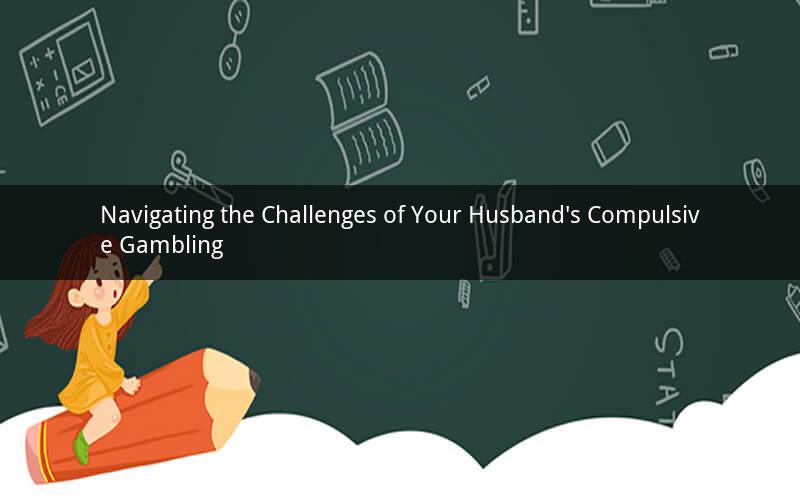
Compulsive gambling can be a challenging issue for any couple, but it can be particularly difficult when your husband is the one struggling with this addiction. Understanding the problem, seeking support, and taking steps to help your husband overcome his gambling addiction are crucial. This article explores the various aspects of dealing with your husband's gambling problem and provides practical advice on how to cope with this challenging situation.
1. Recognizing the Signs of Compulsive Gambling
The first step in dealing with your husband's gambling addiction is to recognize the signs. Here are some common indicators that your husband may have a gambling problem:
- Secretive behavior: Your husband may be hiding his gambling activities from you, which can include lying about where he spends his time or how much money he has spent.
- Financial strain: You may notice that your household budget is being affected by his gambling habits, such as late payments or increased debt.
- Emotional changes: Your husband may experience mood swings, irritability, or depression due to his gambling addiction.
- Isolation: He may withdraw from family and friends, spending more time alone or with other gamblers.
- Risky behavior: Your husband may take on excessive risks in other areas of his life, such as career or personal relationships, due to his gambling addiction.
2. Understanding the Impact of Compulsive Gambling
Compulsive gambling can have a significant impact on various aspects of your life, including your relationship, finances, and mental health. It's essential to understand the consequences of your husband's addiction to effectively address the problem:
- Relationship strain: Your marriage may suffer due to the stress and conflict caused by your husband's gambling addiction. He may become distant, or you may feel betrayed and hurt.
- Financial difficulties: Your household budget may be strained, and you may face the burden of supporting your family while your husband's gambling habits deplete your finances.
- Emotional and mental health: You may experience anxiety, depression, or other mental health issues as a result of your husband's gambling addiction.
3. Seeking Support and Resources
Dealing with your husband's gambling addiction can be overwhelming, but seeking support is crucial. Here are some resources and support systems you can turn to:
- Counseling: Consider seeking individual or couples counseling to help you navigate the challenges of your husband's addiction.
- Support groups: Joining a support group for loved ones of gamblers can provide you with a community of people who understand what you're going through.
- Professional help: Encourage your husband to seek professional help from a therapist or counselor specializing in gambling addiction.
- Financial counseling: If your finances have been affected by your husband's gambling, consider seeking financial counseling to help you manage the debt and rebuild your financial stability.
4. Setting Boundaries and Taking Care of Yourself
As you work to help your husband overcome his gambling addiction, it's essential to set boundaries and take care of yourself. Here are some tips:
- Establish clear boundaries: Communicate your concerns and set clear boundaries regarding your husband's gambling habits. This may include limiting his access to money or restricting his ability to gamble.
- Prioritize self-care: Take time for yourself to maintain your mental and emotional well-being. Engage in activities you enjoy, seek support from friends and family, and prioritize your health.
- Educate yourself: Learn about gambling addiction to better understand the problem and how to support your husband through his recovery process.
5. Encouraging Your Husband's Recovery
Encouraging your husband's recovery is a vital part of dealing with his gambling addiction. Here are some ways to support his journey:
- Be patient: Recovery is a long and challenging process, and it's essential to be patient with your husband as he works through his addiction.
- Encourage open communication: Encourage your husband to share his feelings and concerns with you, and be open to discussing the challenges he faces.
- Celebrate milestones: Acknowledge and celebrate the small victories and milestones your husband achieves in his recovery process.
- Be a source of support: Be there for your husband during difficult times, and remind him of your love and commitment to his recovery.
Frequently Asked Questions
Q1: How can I help my husband overcome his gambling addiction?
A1: Help your husband by seeking professional help, encouraging open communication, and providing a supportive environment. It's also essential to take care of yourself and seek support from others who understand your situation.
Q2: Should I confront my husband about his gambling addiction?
A2: Yes, it's important to confront your husband about his gambling addiction. However, approach the conversation with empathy and understanding, as this can be a sensitive topic for him.
Q3: Can my husband's gambling addiction cause financial problems for our family?
A3: Yes, gambling addiction can lead to significant financial difficulties for your family. It's crucial to address these issues promptly and seek financial counseling if necessary.
Q4: How can I cope with the emotional impact of my husband's gambling addiction?
A4: To cope with the emotional impact, prioritize self-care, seek support from friends and family, and consider joining a support group for loved ones of gamblers.
Q5: Is it possible for my husband to recover from his gambling addiction?
A5: Yes, it is possible for your husband to recover from his gambling addiction. With professional help, support from loved ones, and a strong commitment to change, he can overcome this challenge.